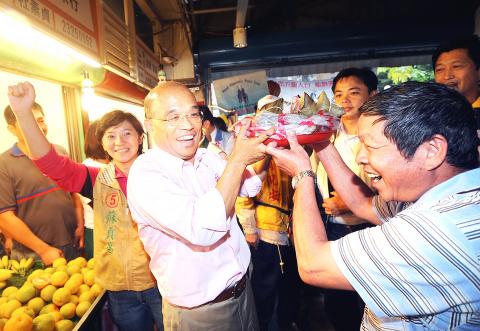The close race between the two Taipei mayoral candidates has prompted the two camps to largely abandon traditional hard-line campaign strategies and de-emphasize party loyalty for the purpose of attracting support from swing voters, as the election looms in less than 10 days.
Both Taipei Mayor Hau Lung-bin (郝龍斌) of the Chinese Nationalist Party (KMT) and Democratic Progressive Party (DPP) Taipei mayoral candidate Su Tseng-chang (蘇貞昌) so far this month have refrained from holding large-scale campaign events to consolidate their base. Instead, they have filled daily schedules with visits to local districts to interact with residents.
For Hau, who has always been awkward expressing himself in public, communicating with voters face-to-face has not been his forte. To help him enhance his connection with voters, the KMT has arranged for President Ma Ying-jeou (馬英九), who doubles as the KMT chairman, and KMT -Secretary-General King Pu-tsung (金溥聰), to accompany Hau he intensively canvass the streets this month looking for support.

PHOTO: FANG PIN-CHAO, TAIPEI TIMES
Last week alone, Ma campaigned for the mayor on three consecutive days. He spent more than two hours at the Raohe Street night market on Saturday night, leading Hau to shake hands with visitors, and sat down chatting with vendors while eating stinky tofu.
The 58-year-old mayor has also learned to stay and chat with the crowd when attending municipal activities, rather than leaving immediately after addressing the events.
Although the KMT is holding a rally on Sunday for Hau, it is playing down its previous campaign theme of anti-corruption in response to former president Chen Shui-bian’s (陳水扁) most recent sentence of a total of 19 years of for corruption charges, and the KMY is turning it into a carnival-like event.
King said the rally, named “A Walk for -Taipei-Taipei Flies High,” will be filled with balloons and toys, and all of Taipei’s residents are welcome to share their thoughts about the city’s future.
The new strategy to tone down the traditional “deep-blue” rhetoric in Hau’s election campaign can also be found in his latest campaign ad, in which he carries a girl on his back wearing a pink T-shirt. The KMT’s blue party color was absent in the ad.
Su, on the other hand, has been leading a non-traditional campaign since the very beginning. With the slogan “Let Taipei surpass Taipei,” his campaign has focused more on social welfare issues and has adopted bright colors such as orange and pink for his campaign.
He has made use of popular online social networking services like Facebook and Plurk to discuss municipal issues and has replaced large-scale campaign activities with hip-hop concerts and “living room meetings” in all of the city’s 12 districts, where local residents have been invited to share their concerns with him.
As a seasoned politician who has maintained a grassroots style, Su interacts with voters more passionately than his KMT counterpart and never hesitates to shake hands or give hugs to supporters.
Su’s campaign spokesman Lee Hou-ching (李厚慶) said reshaping the political alignment in Taipei City, a traditional KMT stronghold, is a main reason behind Su’s decision to run in the election.
The increasing number of swing voters in this election campaign, Lee said, showed that the traditional support bases of the pan-blue and pan-green camps in the city can be changed.

An essay competition jointly organized by a local writing society and a publisher affiliated with the Chinese Communist Party (CCP) might have contravened the Act Governing Relations Between the People of the Taiwan Area and the Mainland Area (臺灣地區與大陸地區人民關係條例), the Mainland Affairs Council (MAC) said on Thursday. “In this case, the partner organization is clearly an agency under the CCP’s Fujian Provincial Committee,” MAC Deputy Minister and spokesperson Liang Wen-chieh (梁文傑) said at a news briefing in Taipei. “It also involves bringing Taiwanese students to China with all-expenses-paid arrangements to attend award ceremonies and camps,” Liang said. Those two “characteristics” are typically sufficient

A magnitude 5.9 earthquake that struck about 33km off the coast of Hualien City was the "main shock" in a series of quakes in the area, with aftershocks expected over the next three days, the Central Weather Administration (CWA) said yesterday. Prior to the magnitude 5.9 quake shaking most of Taiwan at 6:53pm yesterday, six other earthquakes stronger than a magnitude of 4, starting with a magnitude 5.5 quake at 6:09pm, occurred in the area. CWA Seismological Center Director Wu Chien-fu (吳健富) confirmed that the quakes were all part of the same series and that the magnitude 5.5 temblor was

The brilliant blue waters, thick foliage and bucolic atmosphere on this seemingly idyllic archipelago deep in the Pacific Ocean belie the key role it now plays in a titanic geopolitical struggle. Palau is again on the front line as China, and the US and its allies prepare their forces in an intensifying contest for control over the Asia-Pacific region. The democratic nation of just 17,000 people hosts US-controlled airstrips and soon-to-be-completed radar installations that the US military describes as “critical” to monitoring vast swathes of water and airspace. It is also a key piece of the second island chain, a string of

The Central Weather Administration has issued a heat alert for southeastern Taiwan, warning of temperatures as high as 36°C today, while alerting some coastal areas of strong winds later in the day. Kaohsiung’s Neimen District (內門) and Pingtung County’s Neipu Township (內埔) are under an orange heat alert, which warns of temperatures as high as 36°C for three consecutive days, the CWA said, citing southwest winds. The heat would also extend to Tainan’s Nansi (楠西) and Yujing (玉井) districts, as well as Pingtung’s Gaoshu (高樹), Yanpu (鹽埔) and Majia (瑪家) townships, it said, forecasting highs of up to 36°C in those areas